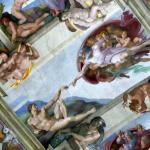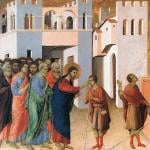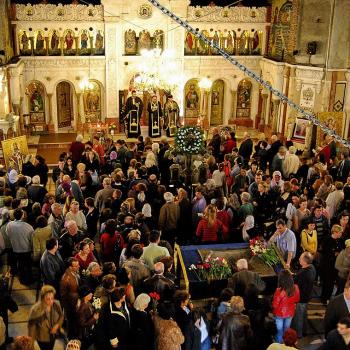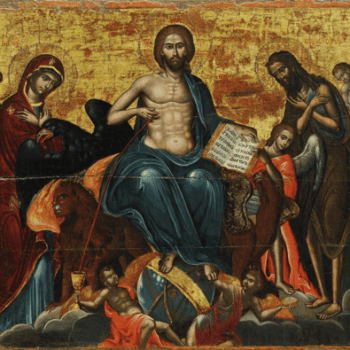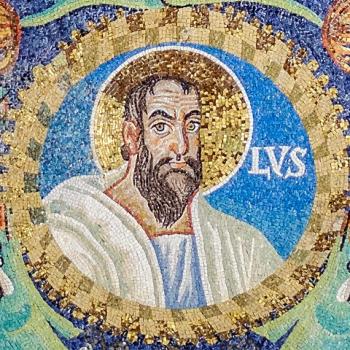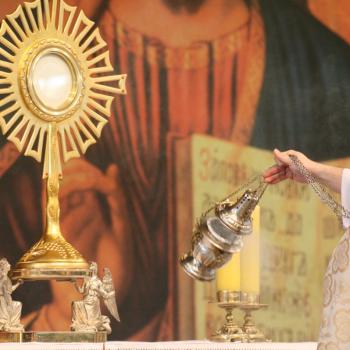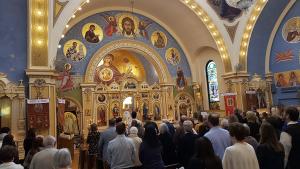
When worship God in the Divine Liturgy (or the Mass, as the West calls it, a name which comes from the dismissal at the end of the worship service), we are participating in and experiencing in the kingdom of God. During the service, we partake of communion, not merely for our own individual benefit, but to be transformed and become more Christ-like as we open ourselves to Christ and realize our unity with him and with everyone else who likewise has become united with him. At the end, we are told to go out into the world; when we do so, we are to share the graces which we have received. If we do not do so, if we jealously guard all the graces we have received, trying to hold them selfishly to ourselves, we have received the eucharist unworthily, and as such, will undercut and undermine the transformation God intended us to have. The end of the liturgy, therefore, is an important part of the liturgy because it reminds us that what we receive is for everyone, and not just for ourselves, that we are to go out into the world and not stay apart from it and everyone in it:
The act of dismissal in the Divine Liturgy is as much a liturgical and sacramental action as was the original act of gathering. It is the final critical step of the entire movement of the liturgy. In their dismissal from the liturgical gathering, the People of God are commanded to go forth in peace into the world to bear witness to the Kingdom of God of which they were partakers in the Liturgy of the Church. They are commanded to take everything that they have seen and heard and experienced within the Church and to make it alive in their own persons within the life of this world. Only in this way can the presence and power of the Kingdom of God which is “not of this world” extend out of the Church and into the lives of men.[1]
We are to go forth in peace, sharing the peace of the kingdom of God, a peace which is greater than the peace of the world, with the world itself. In doing so, we help work and promote what we pray during the liturgy when we recite the Our Father, that is, we play our role in implementing God’s will on earth. Of course, we are not to go into the world and use force to dominate and control it, thinking in this fashion, we will bend the will of everyone so that they follow God’s will. Instead, we encourage others to freely join with us, to experience the grace of the kingdom of God for themselves, so that they can be transformed from within and in that transformation, freely engage God’s will and help transform the world with us in the same way we did with them.
We are to share the love of God with the world, the love which is kind and patient, ever merciful and not cruel; the more we do so, the more people see the positive effects of that love, the more it will become attractive and they will seek it out for themselves. If we, however, are closed to such love, if we are selfish instead of loving, seeking to control the world and force it to be what we want it to be instead of giving it and those in it the freedom needed for love to truly thrive, we will find ourselves turning into a monstrous imitation of what Christ wants from us:
Coldness of heart is such a monster that human powers are incapable of conquering it. In order to soften the heart, one must persist in the spiritual labor of love toward one’s neighbor; one must have much compassion toward the weakness of others and forgiveness of these faults. [2]
We receive communion worthily if we embrace in it the love of God so that we let the love of God take over us. We will then do the works of love ourselves. Where we find those who are weak, those who are suffering injustice, those who hunger and thirst, those who are sick and needing healing, we will do what we can to help them, both personally, but also socially (helping society to become just instead of ignoring such injustices). We are to go into the prisons and work with prisoners, helping them in the ways which the need it: for those who have been unjustly imprisoned, we do that by finding a way to have their freedom restored, while those who have justly been imprisoned, we work with them so that they can be rehabilitated and changed so that they can eventually rejoin society. We must do so making sure we do not stop grace from working within us, lest we find ourselves falling into sin once again, becoming one of those who are in need of restorative grace:
Granted we are earthly, granted we move about the earth, nevertheless our residence is in heaven; there we have our citizenship. ‘The maker of heaven and earth.’ Even though you are a sinner, do not be discouraged; the Lord is all powerful. Many of earth have become heaven, and many of heaven have become earth. Unhappy Judas was heaven, and he became earth. Paul the Apostle was earth when he was persecuting the church; he confessed and became heaven. It behooves one who is of heaven not to feel secure, nor ought he who is of earth lose hope of life.[3]
In a sense, then, though there is an end to the worship time, the liturgy can be said to be never-ending. When we participate in it, we find ourselves participating in the eternal sacrifice of love, the love found at the center of the Godhead, the love revealed to us by the Logos made flesh, Jesus, who in his flesh, willing took on the sin of the world on his shoulders so that we can be eternally freed from sin and all its effects. When we go out into the world, seeking to help transform the world and make it better, perfecting it through grace (and not by domination and control), we are continuing our experience of the liturgy. It only ends for us if we close ourselves off from the mission given to us at the dismissal.
[1] Thomas Hopko, The Orthodox Faith. Volume 2: Worship (Yonkers, NY: St Vladimir’s Seminary Press, 1981; rev. ed. 2016), 180.
[2] Abbes Arsenia (Sebriakova), Striving Toward God. Trans. Mary Naumenko (Jordanville, NY: Holy Trinity Publications, 2016), 51 [Letter 73 to Peter Alexandrovich Brianchaninov].
[3] St. Jerome, The Homilies of Saint Jerome: Volume I (1-59 On the Psalms). Trans. Marie Liguori Ewald, IHM (Washington, DC: CUA Press, 1963), 351 [Homily 46].
Stay in touch! Like A Little Bit of Nothing on Facebook.
If you liked what you read, please consider sharing it with your friends and family!
N.B.: While I read comments to moderate them, I rarely respond to them. If I don’t respond to your comment directly, don’t assume I am unthankful for it. I appreciate it. But I want readers to feel free to ask questions, and hopefully, dialogue with each other. I have shared what I wanted to say, though some responses will get a brief reply by me, or, if I find it interesting and something I can engage fully, as the foundation for another post. I have had many posts inspired or improved upon thanks to my readers.


